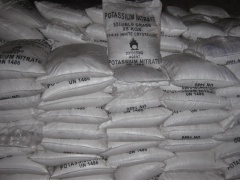Difference between revisions of "Potassium Nitrate"
m (→Shipment / Storage / Risk factors) |
m (→Shipment / Storage / Risk factors) |
||
| Line 15: | Line 15: | ||
For overseas carriage consult the IMSBC Code (International Maritime Solid Bulk Code) as published by IMO (International Maritime Organization); the IMDG Code and applicable MSDS sheet<br><br> | For overseas carriage consult the IMSBC Code (International Maritime Solid Bulk Code) as published by IMO (International Maritime Organization); the IMDG Code and applicable MSDS sheet<br><br> | ||
| − | See also [[ | + | See also [[Fertilisers]] |
Latest revision as of 13:09, 4 August 2014
| Infobox on Potassium Nitrate | |
|---|---|
| Example of Potassium Nitrate |  |
| Facts | |
| Origin | - |
| Stowage factor (in m3/t) | 0,88 m3/t (bulk) |
| Humidity / moisture | - |
| Ventilation | No |
| Risk factors | See text |
Potassium Nitrate
Description / Application
Potassium nitrate is a chemical compound with the formula KNO3. It is an ionic salt of potassium ions K+ and nitrate ions NO3.
It occurs as a mineral niter and is a natural solid source of nitrogen. Potassium nitrate is one of several nitrogen-containing compounds collectively referred to as saltpeter or saltpetre.
Major uses of potassium nitrate are in fertilizers, rocket propellants and fireworks. It is one of the major constituents of gunpowder (blackpowder) and has been used since the Middle Ages as a food preservative.
Shipment / Storage / Risk factors
Potassium nitrate Is a strong oxidizing agent. A dangerous fire and explosion risk when shocked or heated or in contact with organic materials. Is essentially a hygroscopic commodity.
For overseas carriage consult the IMSBC Code (International Maritime Solid Bulk Code) as published by IMO (International Maritime Organization); the IMDG Code and applicable MSDS sheet
See also Fertilisers











